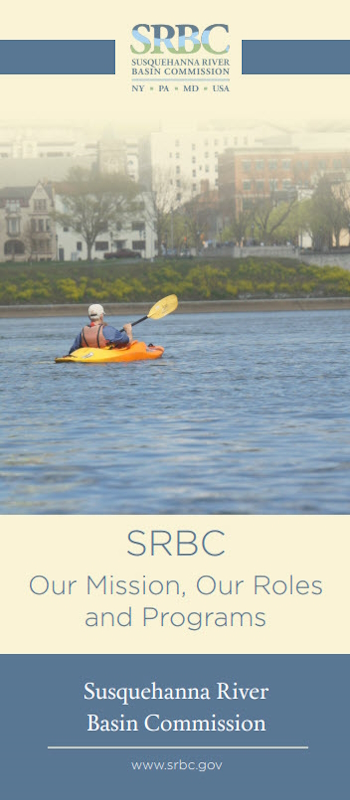About Us

In the late 1960s, a broad group of concerned citizens saw the need for a federal-interstate coordinating agency to lead the conservation, development, and administration of the Susquehanna River Basin’s resources that would preserve and enhance its value as a scenic and recreational asset for the people who live in the Basin. The need to coordinate these efforts, along with those of three states and the agencies of the federal government, led to the drafting of the Susquehanna River Basin Compact , which was signed on December 24, 1970. The Compact, as adopted by the Congress of the United States and the legislatures of New York State, Pennsylvania, and Maryland, provides the mechanism to guide the water resource management of the Basin. The Compact, which went into effect on January 23, 1971, also established the Susquehanna River Basin Commission as the agency to coordinate these water resource efforts.
Each member state/jurisdiction is represented by a commissioner who serves as the spokesperson for the government that he or she represents. In the case of the federal government, the commissioner has been identified in legislation as the Division Engineer, North Atlantic Division, U.S. Army Corps of Engineers. For the three states, the commissioners are the governors or their designees. The commissioners also appoint alternate commissioners.
The commissioners, or their alternates, meet quarterly to act on a variety of programmatic and administrative matters, including applications for projects using water; adopting regulations, policies and budgets; and enacting various planning and management activities. Each of the four commissioners has a single vote.
The commissioners, subject to the provisions of the Compact (Section 15.1(b)(3)), establish Commission By-Laws to govern its operation. Under the leadership of the Executive Director, technical and administrative personnel support the daily operations of the Commission.
Statement of Mission/Goals
The mission of the Commission, which is defined in the Compact, is to enhance public welfare through comprehensive planning, water supply allocation, and management of the water resources of the Susquehanna River Basin.
To accomplish this mission, the Commission works to: reduce damages caused by floods; provide for the reasonable and sustained development and use of surface and ground water for municipal, agricultural, recreational, commercial and industrial purposes; protect and restore fisheries, wetlands and aquatic habitat; protect water quality and instream uses; and ensure future availability of flows to the Chesapeake Bay.
The goals of the Commission are:
- To be responsive to water resource management needs of the Commission's signatory members.
- To provide excellent service to the public.
- To coordinate management of interstate water resources and serve as an effective forum for resolution of water resource issues and controversies within the Basin.
- To be a leader in issues concerning the conservation, utilization, allocation, development, and management of water resources within the Susquehanna River Basin.
- To encourage excellence in staff by affording opportunities for professional growth and development and by providing a stimulating work environment for all Commission employees.
- To provide public information and education about the water resources of the Basin.

For a snapshot of historical and current water resources topics please see our Public Information Pamphlets.
Commitment to Community Engagement
SRBC recognizes that the people and businesses that comprise our communities are the public we are privileged to serve. Our work through comprehensive water resource planning, water supply allocation and building resiliency to floods and droughts advances the public welfare and allows communities to thrive economically and with robust natural water features. The Commission is committed to undertaking our work in cooperative partnership with our communities by inviting viewpoints from all stakeholders and being a presence in all our diverse communities. We are collectively stronger when all voices are represented and we will make concerted efforts to ensure broad access to opportunities for input and to the benefits associated with our shared water resources. For more information about opportunities to provide input, please visit our Public Participation page and consult our Public Reference Manual.
Comprehensive Plan and Water Resources Program
The Commission, subject to the provisions of the Compact (Sections 3.3 and 14.1), developed the Comprehensive Plan for the Water Resources of the Susquehanna River Basin. The Comprehensive Plan provides a framework for the Commission to manage and develop the Basin's water resources and serves as a guide for all Commission programs and activities.
The Commission, subject to the provisions of the Compact (Section 14.2), also annually adopts a Water Resources Program to implement various goals and actions identified in the Comprehensive Plan. The Water Resources Program consists of projects that the Commission, other agencies, and the private sector, plan to undertake to help meet the water resources needs of the Basin.
Awards
The Commission has established the following awards to honor individuals or organizations in recognition of their many contributions to the Commission and extraordinary achievements within the Susquehanna River Basin.

The Maurice K. Goddard Award honors individuals who demonstrate excellence in water resource management.

The William W. Jeanes Sr. Award honors individuals or organizations who make significant contributions to protect the water quality of the Susquehanna River Basin.

The Herbert M. Sachs Award for Lifetime Achievement in Watershed Management honors individuals who have devoted a lifetime of outstanding service to the cause of watershed management consistent with the principles and purposes set forth in the Susquehanna River Basin Compact.

The Frederick L. Zimmermann Award recognizes elected officials who demonstrate excellence in water resource management by promoting and advancing watershed management and interstate cooperation.
